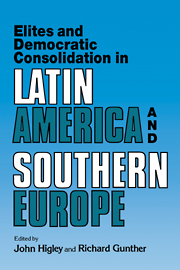Book contents
- Frontmatter
- Contents
- About the contributors
- Preface
- 1 Introduction: elite transformations and democratic regimes
- 2 Spain: the very model of the modern elite settlement
- 3 Elite settlements and democratic consolidation: Colombia, Costa Rica, and Venezuela
- 4 Mexico's elite settlement: conjuncture and consequences
- 5 Elite unification and democratic consolidation in Italy: a historical overview
- 6 The role of civil–military pacts in elite settlements and elite convergence: democratic consolidation in Uruguay
- 7 Patterns of elite negotiation and confrontation in Argentina and Chile
- 8 Elites in an unconsolidated democracy: Peru during the 1980s
- 9 Brazil's political transition
- 10 Redefining the Portuguese transition to democracy
- 11 The Dominican case
- 12 Elites and democratic consolidation in Latin America and Southern Europe: an overview
- Index
Preface
Published online by Cambridge University Press: 05 June 2012
- Frontmatter
- Contents
- About the contributors
- Preface
- 1 Introduction: elite transformations and democratic regimes
- 2 Spain: the very model of the modern elite settlement
- 3 Elite settlements and democratic consolidation: Colombia, Costa Rica, and Venezuela
- 4 Mexico's elite settlement: conjuncture and consequences
- 5 Elite unification and democratic consolidation in Italy: a historical overview
- 6 The role of civil–military pacts in elite settlements and elite convergence: democratic consolidation in Uruguay
- 7 Patterns of elite negotiation and confrontation in Argentina and Chile
- 8 Elites in an unconsolidated democracy: Peru during the 1980s
- 9 Brazil's political transition
- 10 Redefining the Portuguese transition to democracy
- 11 The Dominican case
- 12 Elites and democratic consolidation in Latin America and Southern Europe: an overview
- Index
Summary
Is another book on democratization really needed? After all, the past five years have seen a flood of writing on the subject, most notably the four volumes edited by Guillermo O'Donnell, Philippe Schmitter, and Laurence Whitehead, Transitions from Authoritarian Rule (1986–7) and the still more comprehensive quartet of volumes put together by Larry Diamond, Juan Linz, and Seymour Martin Lipset, Democracy in Developing Countries (1988–91). Drawing on the expertise of more than fifty scholars, containing extensive analyses of at least thirty countries, and totaling more than two thousand pages, these eight volumes – augmented by the overview works of John Herz (1982), Julián Santamaría (1982), Guy Hermet (1983), Martin Needier (1987), James Malloy and Mitchell Seligson (1987), Enrique Baloyra (1987), and Giuseppe Di Palma (1990), not to mention a large number of monographic studies – must surely exhaust the subject for now.
Yes and no. Apart from some updating to cover the most recent events, our factual knowledge cannot be extended significantly by another book dealing with democratic transitions in many of the same countries. Justification for such a volume therefore lies at the theoretical and interpretive level. Here, we believe, there is room for further work.
This book is distinct from the existing literature on democratization, in two ways. First, each of the country studies focuses on factors that contribute to the successful consolidation of democratic regimes, rather than the transition to democracy per se.
- Type
- Chapter
- Information
- Publisher: Cambridge University PressPrint publication year: 1991

